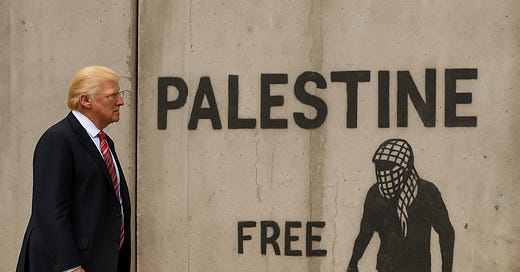Trump’s Middle East Tour and the Vanishing of Palestine
The Absence That Spoke Louder Than Words
They rolled out the carpets, stitched with threads of complicity. In Riyadh, in Doha, in Abu Dhabi, the choreography was immaculate. Gold and guns traded glances. There were swords raised in dances that once heralded warriors but now ushered in arms deals worth billions. Smiles froze into place beneath keffiyehs and crowns. Donald Trump, the dealmaker in chief, sailed through the Middle East this week like a man blind to his own shadows.
But it was not the scandals that haunted the visit. It was what the visit refused to see. What it studiously omitted. What it smothered under the weight of pomp and precision. Palestine.
Palestine, where walls are higher than hopes. Where the silence of the powerful is more devastating than the rockets that fall. Where mothers know better than to name their sons "Fateh" or "Amal" (victory and hope), because the names become too heavy to carry to the grave.
There was no mention of Palestine in Trump’s speeches . He said words about peace. About prosperity. About defeating terror. But he did not say “occupation.” He did not say “settlements.” He did not say “Palestinian.”
Silence, in politics, is not passive. It is not absence. It is a choice. A tactic. A weapon.
To watch the tour unfold was to watch an entire people edited out of a narrative they inhabit daily with their blood. Palestine was reduced to an unspoken inconvenience. A stain on the linen-white script of a new Middle East: one that makes room for trillion-dollar contracts, not inconvenient truths. A Middle East held together by the glue of petrodollars and the cement of complicity.
In the alleyways of Hebron, where settlers spit on schoolchildren, and in Gaza, where the electricity hums with the rhythm of siege, the people still speak. They speak in the dialect of defiance. They write their stories on walls, their memories in martyrdoms. But in the great marble halls where power dines, these stories are dismissed as background noise. As "complexity." As "conflict fatigue." How easy it is to ignore a cry when it is framed as a cacophony.
Trump’s Middle East tour was a masquerade. A photo-op superimposed on ruins. He spoke of shared values with regimes that flog poets and disappear dissidents. He spoke of fighting extremism while his own policies fueled it. He danced with swords even as the bodies they cut still lie unburied in Yemen, in Syria, in the unmentionable corners of maps where American-made bombs fall like iron rain.
And yet, what was most chilling was not what was said but what was strategically unsaid. To mention Palestine would be to admit to injustice. To acknowledge a people whose very existence is an indictment of the current order. To speak of Palestine would be to confront occupation, apartheid, and the dream deferred for seven decades. So better to speak of "peace;” the kind that comes with contracts and combat jets, not with justice.
It is a particular kind of cruelty to erase a people with silence. To rewrite the script of the region without them in it. As though they were never there. As though olive groves do not remember the hands that once harvested them. As though keys held by refugees do not still turn in invisible locks.
Palestine was not absent because it is unimportant. It was absent because it is inconvenient. It does not fit the contours of the "strategic realignments" now underway: the warming between Gulf monarchies and Israel, the looming specter of Iran, the relentless reduction of everything to dollars and drones.
But the absence was loud. Deafening. It clung to the speeches, the handshakes, the sterile joint statements. It hung in the air like dust from a demolished home.
And the people who walk barefoot over rubble, who bury their dead under curfews, who teach children to count in checkpoints noticed. They always do.
Because to them, silence is not a lapse. It is a message.
And they have heard it before.




